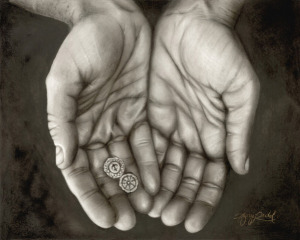We wonder if a tree falling in the forest makes a sound if there is no one there to hear it. Along those lines we might ask: is it really an act of generosity if you do it and no one witnesses it?
Today’s text follows a long series of teachings of Jesus (Mark 11:27-12:40) during which he’s been standing. He has defeated his various opponents in a series of verbal duals and demonstrated his authority to a sympathetic scribe who is amazed by his summary of the Torah, or commandments of Yahweh. Now Jesus goes on the offensive, sparing with the scribes (who are not sympathetic to him, his vision,and the people in general). At the end of this spiritual battle (as we may call it) Jesus takes a well deserved seat (v. 41) and observes what’s going on around him in the Temple, then denounces in public the hypocrisy of the scribes he witnesses.
We can easily be a bit befuddled as we read these exchanges deeply rooted in that culture and time. In the first section, Jesus uses a traditional Jewish exegetical method to challenge the teaching of the scribes. He establishes the inferiority of one biblical character to another through ingenious juxtaposition. It’s an innovate reading by Jesus for he seems to go against the scriptural vision that the Messiah would be issued of David’s line. The logic is based in the hierarchical Greco-Roman worldview in which “Lord” and “son” were near opposite terms. A father would never refer to his son as “lord”, a term of deference and respect. Jesus seems to be saying that his identity is establish less with his relationship to King David, than it is with God.
In the second section, Jesus talks about the danger of privileged religious leaders. In the honor conscious Greco-Roman society important people would always dress ostentatiously and also be greeted in public before they would stoop to greet someone of less importance. They would equally expect the best seats at public events. The widow’s house was both the place and the property. It would be the “estate” bequeathed to her at the death of her husband: the sum total of her wealth with which to care for herself & children. Scribes acted as lawyer trustees for such estates, charging a service fee for their work. These scribes commit a heinous crime, abusing and profiting from the defenseless – the orphans, widows and other helpless (like foreigners).
Some cultural cues in the final section, include that the widow gives two small copper coins : two leptas – which was not an official designation of money, more a general term like the word “mite” in English. 2 lepta made a Quadran – the least valuable Roman coin equal to 1/64 of a denarius (the average day’s wage). Also the Temple Treasury was a storeroom in the Temple not accessible to laypeople. It functioned partly as a bank for widows as they couldn’t keep their own money.
Throughout these encounters Jesus demasks the brutal reality that religiosity may conceal a lack of faith, honesty and compassion.
Questions for Going Deeper:
- What word, phrase or image in this text shimmers for you?
- How do you struggle with generosity, or practicing your faith?
- What invitation do you hear from God in this text to act, say, be or do?
